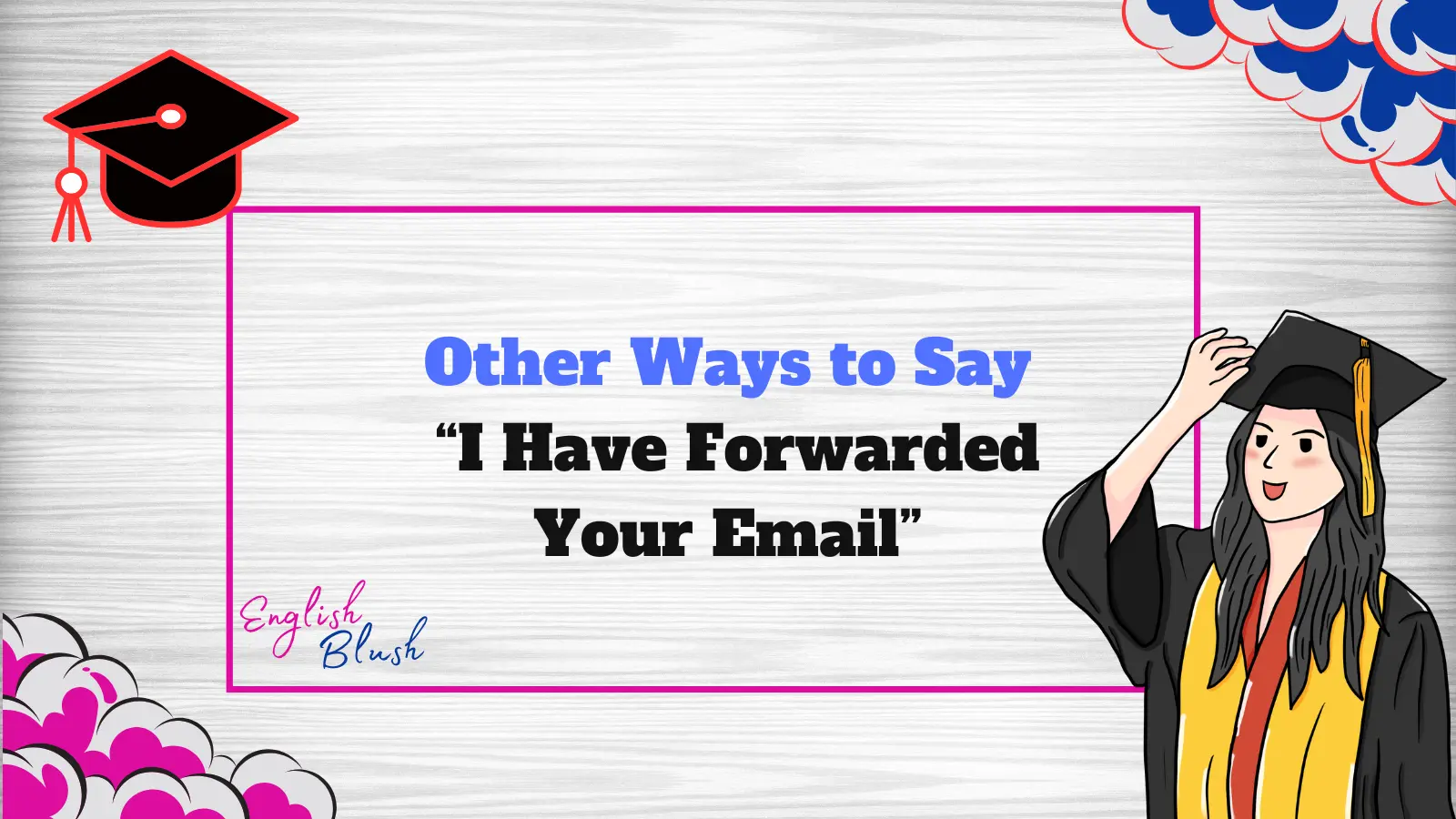Are you tired of repeatedly saying “I have forwarded your email” and want to add more variety to your email communication? Whether you’re in a professional setting or simply want to sound more polished, using different ways to express the same idea can make your messages more engaging and efficient. In this article, we’ll explore alternative phrases to “I have forwarded your email” that can help you sound more confident and professional.
So, keep reading to discover the best ways to refresh your email routine!
Top List Of Other Ways to Say “I Have Forwarded Your Email”
- “I’ve Sent Your Email to [Recipient’s Name]”
- “I’ve Passed Your Email Along to [Recipient’s Name]”
- “I Have Directed Your Email to [Recipient’s Name]”
- “I’ve Routed Your Email to [Recipient’s Name]”
- “I’ve Sent That Over to [Recipient’s Name]”
- “I’ve Shared Your Email with [Recipient’s Name]”
- “I’ve Transferred Your Email to [Recipient’s Name]”
- “I’ve Made Sure Your Email Reaches [Recipient’s Name]”
- “I’ve Passed Your Request to [Recipient’s Name]”
- “I’ve Notified [Recipient’s Name] of Your Email”
- “I’ve Escalated Your Email to [Recipient’s Name]”
- “I’ve Forwarded the Email to [Recipient’s Name] for Review”
- “I’ve Sent Your Message to [Recipient’s Name]”
- “I’ve Delivered Your Email to [Recipient’s Name]”
- “I’ve Redirected Your Email to [Recipient’s Name]”
- “I’ve Conveyed Your Email to [Recipient’s Name]”
- “I’ve Shared Your Inquiry with [Recipient’s Name]”
- “I’ve Relayed Your Email to [Recipient’s Name]”
- “I’ve Handed Over Your Email to [Recipient’s Name]”
- “I’ve Delegated Your Email to [Recipient’s Name]”
- “I’ve Appointed [Recipient’s Name] to Handle Your Email”
- “I’ve Directed Your Inquiry to [Recipient’s Name]”
1. “I’ve Sent Your Email to [Recipient’s Name]”
This is a straightforward way of communicating that you’ve forwarded the email to someone. It’s clear, professional, and easy to understand.
Scenario Example Subject: Update on the Project
Dear Leo, Just a quick note to let you know that I’ve sent your email to Henry for review. He will get back to you as soon as possible. Best regards, [Your Name]
Additional Tip: Using the recipient’s name in the phrase adds a personal touch, ensuring the recipient knows exactly who the email was directed to.
2. “I’ve Passed Your Email Along to [Recipient’s Name]”
The phrase “passed along” conveys the act of forwarding the email in a more casual tone, while still maintaining professionalism.
Scenario Example Subject: Project Timeline
Hi Leo, I passed your email along to Henry, and he will be in touch with his feedback shortly. Best, [Your Name]
Additional Tip: This phrase is particularly effective in informal or semi-formal communication.
3. “I Have Directed Your Email to [Recipient’s Name]”
This alternative emphasizes the act of sending the email to a specific person, which can be a bit more formal.
Scenario Example Subject: Budget Inquiry
Dear Leo, Just to inform you, I have directed your email to Henry. He is the right person to address your query and will respond soon. Best regards, [Your Name]
Additional Tip: This phrase can also imply that you’ve chosen the appropriate person for the task, adding a layer of professionalism.
4. “I’ve Routed Your Email to [Recipient’s Name]”
The word “routed” suggests that the email has been sent along a specific path to the appropriate person.
Scenario Example Subject: Client Feedback
Hi Leo, I wanted to let you know that I’ve routed your email to Henry for further action. He’ll get back to you soon. Best, [Your Name]
Additional Tip: This phrase might be best for more formal or technical communications, especially in larger organizations.
5. “I’ve Sent That Over to [Recipient’s Name]”
This casual phrase works well in less formal settings where a friendly tone is preferred.
Scenario Example Subject: Invoice Clarification
Hey Leo, I just wanted to let you know that I’ve sent that over to Henry. He’ll follow up with you soon. Thanks, [Your Name]
Additional Tip: It works well when you want to keep the tone relaxed but still clear.
6. “I’ve Shared Your Email with [Recipient’s Name]”
“Shared” is a great alternative that emphasizes collaboration, suggesting that the email was not just forwarded, but also made available to the recipient for discussion.
Scenario Example Subject: Vendor Partnership Proposal
Dear Leo, I’ve shared your email with Henry. He is reviewing it now and will get back to you with comments shortly. Kind regards, [Your Name]
Additional Tip: This is an excellent choice when the conversation requires ongoing collaboration.
7. “I’ve Transferred Your Email to [Recipient’s Name]”
The word “transferred” adds a sense of action, signifying that the email has been moved from one person to another.
Scenario Example Subject: Contract Draft Review
Hi Leo, Just to confirm, I’ve transferred your email to Henry. He will take a look at the contract and get back to you soon. Best regards, [Your Name]
Additional Tip: Use this phrase when you want to emphasize the act of moving responsibility for the email.
8. “I’ve Made Sure Your Email Reaches [Recipient’s Name]”
This phrase adds a touch of reassurance, letting the recipient know that you’ve ensured their email has been received by the correct person.
Scenario Example Subject: Partnership Opportunity
Dear Leo, I’ve made sure your email reaches Henry. He’ll be in touch with his thoughts shortly. Best, [Your Name]
Additional Tip: This is a great option when you want to assure the sender that you’ve taken care of the process.
9. “I’ve Passed Your Request to [Recipient’s Name]”
This is a helpful variation when the email includes a request that’s being forwarded to someone who can take action.
Scenario Example Subject: Vacation Request Approval
Hi Leo, Just a heads-up, I’ve passed your request to Henry for approval. You should hear back soon. Best regards, [Your Name]
Additional Tip: This phrase is effective when dealing with requests, ensuring the recipient knows their query is being handled.
10. “I’ve Notified [Recipient’s Name] of Your Email”
This alternative focuses on the fact that you’ve informed someone else about the email.
Scenario Example Subject: Deadline Clarification
Dear Leo, Just to let you know, I’ve notified Henry of your email regarding the project deadline. He will provide an update shortly. Best regards, [Your Name]
Additional Tip: This phrase works well if you want to emphasize that someone has been made aware of the contents of the email.
11. “I’ve Escalated Your Email to [Recipient’s Name]”
This phrase is especially useful in situations where the email requires urgent attention or needs to be handled by someone with higher authority.
Scenario Example Subject: Urgent Financial Issue
Hi Leo, I’ve escalated your email to Henry, as it requires immediate attention. He’ll respond as soon as possible. Best, [Your Name]
Additional Tip: Perfect for high-priority emails that require immediate action.
12. “I’ve Forwarded the Email to [Recipient’s Name] for Review”
This is a direct and clear phrase when you want to communicate that the email is being sent for review or further action.
Scenario Example Subject: Monthly Sales Report
Hi Leo, I’ve forwarded the email to Henry for review. He’ll get back to you with feedback soon. Thanks, [Your Name]
Additional Tip: This is effective when the recipient needs to wait for feedback or approval.
13. “I’ve Sent Your Message to [Recipient’s Name]”
“Message” is a slightly more informal word for email, making this a good option for less formal communications.
Scenario Example Subject: Event Registration
Hey Leo, Just to update you, I’ve sent your message to Henry. He will confirm your registration shortly. Best, [Your Name]
Additional Tip: This phrase can be used for quick communications when the tone is more casual.
14. “I’ve Delivered Your Email to [Recipient’s Name]”
“Delivered” implies that the email has been successfully sent and received, providing a sense of completion.
Scenario Example Subject: Proposal Feedback
Dear Leo, I’ve delivered your email to Henry and he will get back to you with his feedback soon. Best regards, [Your Name]
Additional Tip: This is a great choice when you want to communicate that the email has been fully received and processed.
15. “I’ve Redirected Your Email to [Recipient’s Name]”
This phrase implies that the email was directed elsewhere for proper handling, and it adds a bit of formality to your communication.
Scenario Example Subject: Customer Inquiry
Hi Leo, I’ve redirected your email to Henry for resolution. He will respond to your inquiry as soon as possible. Best regards, [Your Name]
Additional Tip: This is useful in situations where the original recipient may not be the best person to handle the email.
16. “I’ve Conveyed Your Email to [Recipient’s Name]”
“Conveyed” adds a sense of formality, often used in professional or legal contexts when forwarding important information.
Scenario Example Subject: Legal Document
Dear Leo, I’ve conveyed your email to Henry for his review. He will contact you shortly with his thoughts. Best regards, [Your Name]
Additional Tip: Use this when the email contains important or legal information.
17. “I’ve Shared Your Inquiry with [Recipient’s Name]”
This is perfect when you’ve forwarded an email containing a question or inquiry.
Scenario Example Subject: IT Support Request
Hi Leo, I’ve shared your inquiry with Henry. He will be in touch to assist you with the issue. Best, [Your Name]
Additional Tip: Ideal for customer service or IT-related communication.
18. “I’ve Relayed Your Email to [Recipient’s Name]”
“Relayed” gives the impression of passing along information to someone who needs to act on it.
Scenario Example Subject: Marketing Strategy Proposal
Dear Leo, I’ve relayed your email to Henry for review. He will get back to you soon with his comments. Best regards, [Your Name]
Additional Tip: This works well when the email contains updates or proposals that need further attention.
19. “I’ve Handed Over Your Email to [Recipient’s Name]”
This phrase is effective when you want to communicate that the responsibility of the email has been transferred to someone else.
Scenario Example Subject: Contract Finalization
Hi Leo, I’ve handed over your email to Henry for the final review. He will get back to you shortly. Best, [Your Name]
Additional Tip: Use when you want to emphasize the action of transferring responsibility.
20. “I’ve Delegated Your Email to [Recipient’s Name]”
“Delegated” indicates that the responsibility for responding to the email has been assigned to someone else.
Scenario Example Subject: Team Assignment
Hi Leo, I’ve delegated your email to Henry. He will take care of it and get back to you soon. Best regards, [Your Name]
Additional Tip: Great for leadership or managerial communications where you need to assign tasks.
21. “I’ve Appointed [Recipient’s Name] to Handle Your Email”
This phrase is formal and gives the impression of assigning a specific person to deal with the email’s contents.
Scenario Example Subject: Appointment Scheduling
Dear Leo, I’ve appointed Henry to handle your email regarding scheduling. He will confirm the appointment details soon. Best, [Your Name]
Additional Tip: Ideal for formal business settings, especially when tasks are being assigned to specific individuals.
22. “I’ve Directed Your Inquiry to [Recipient’s Name]”
This variation works well when the email contains an inquiry or request that is best addressed by someone else.
Scenario Example Subject: Partnership Questions
Hi Leo, I’ve directed your inquiry to Henry. He is the appropriate person to assist you and will follow up soon. Best regards, [Your Name]
Additional Tip: This phrase works best when the message requires a response from someone with expertise.
Conclusion In professional communication, expressing that you’ve forwarded an email doesn’t need to be repetitive or dull. With these 22 alternative phrases, you can enhance your email communication, making it more dynamic, clear, and professional. Whether you’re conveying information to a colleague or updating a client, these variations will help you craft more engaging messages that suit different contexts and relationships.





